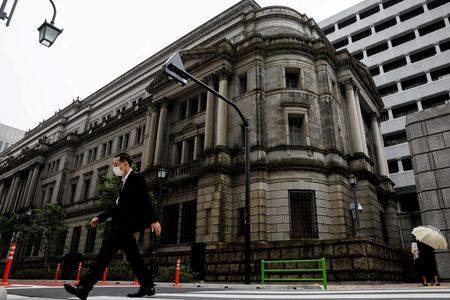 1
1 1
1

By Leika Kihara
TOKYO (Reuters) – The Bank of Japan on Monday offered to buy unlimited amounts of 10-year Japanese government bonds (JGBs) at 0.25%, stepping into the market to defend its implicit yield cap for the second time this year.
The move came after the 10-year JGB yield crept up to a six-year high of 0.245% in early trade, just a half of a basis point shy of the BOJ’s tolerance ceiling under its yield curve control policy.
The offer, which is the first since Feb. 10 and to be executed on Tuesday, pushed the dollar to a more than six-year high of 122.78 yen as investors focused on prospects of widening U.S-Japan interest rate differentials.
“The move, which was largely anticipated, will help curb rises in JGB yields,” said Masahiro Ichikawa, chief market strategist at Sumitomo Mitsui DS Asset Management.
“This operation is a message from the BOJ that it will maintain ultra-easy policy for the time being,” he said.
The 10-year JGB yield has been creeping up in tandem with a rise in U.S. long-term interest rates, as investors have priced in the prospect of aggressive rate hikes by the Federal Reserve.
Markets had been focusing on when the BOJ could step in to defend the 0.25% ceiling, after refraining to do so on Friday as the 10-year yield topped the level at which the central bank had offered to buy an unlimited amount in February.
The BOJ’s current guidance is that it will allow the 10-year yield to move flexibly around its 0% target as long as it stays below the 0.25% upper limit, though it will take into account not just the level but the speed of any rise in yields.
The 10-year JGB yield has been creeping up in tandem with a rise in U.S. long-term interest rates, as investors have priced in the prospect of aggressive rate hikes by the Federal Reserve over the course of this year.
BOJ Governor Haruhiko Kuroda has repeatedly said the central bank would maintain interest rates at the current ultra-low levels, given the fragile economic recovery and as inflation remains well below its 2% target.
(Reporting by Leika Kihara; Additional reporting by Kantaro Komiya; Editing by Shri Navaratnam and Stephen Coates)